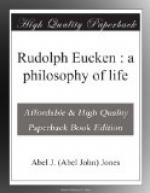begin their investigation with a consideration of
matter, and proceed by slow degrees to attempt to explain
the reality at the basis of it. Some never get
further, and dispense with the question of human life
and thought as mere aspects or manifestations of the
material world. But the problem of life is for
Eucken the one problem—he seeks to find
the reality beneath the superficialities of human
existence, and he has little to say concerning the
world of matter. And, after all, it is the problem
of life that urgently calls for solution, for upon
the solution that is accepted, the life of the individual
is to a large extent based. It is, of course,
very interesting to meditate and speculate upon the
material world, its origin and evolution, but the
question is very largely one of mere theoretical interest—a
kind of game or puzzle for studious minds. It
is the question of life itself that is ultimately
of practical interest to every human soul. And
this is the problem that Eucken would solve. Hence
those who expect to find a closely reasoned philosophy
on matter and its manifestations must look elsewhere,
for Eucken has little for them. Eucken’s
philosophy is a philosophy of life, and he only touches
incidentally those aspects of philosophy that are not
immediately concerned with his special problem.
He refuses to be allured from the main problem by
subsidiary investigations, and perhaps rightly so,
for one problem of such magnitude would seem to be
enough for one human mind to attempt. Eucken
is a philosopher who lays foundations and deals with
broad outlines and principles; it must be left to his
many disciples to fill in any gaps that exist on this
account, by attempting to solve the subsidiary problems
with which Eucken cannot for the present concern himself.
If Eucken’s problem differs fundamentally from
that of most other philosophers, perhaps the purpose
of his investigations is still a more striking characteristic.
He is anxious to solve the riddle of the universe
in order that there may be drawn from the solution
an inspiration which shall help the human race to
concentrate its energies upon the highest ideals of
life. The desire to find a meaning which will
explain, and at the same time infuse zest and gladness
into every department of life has become a passion
with him, and in finding that meaning, his great endeavour
is to prove the truth of human freedom and personality.
He wishes to solve the riddle in order that man may
become a better man, the world a better world.
His aim is definitely an ethical aim, and his purpose
a practical one of the noblest order, and not one
of mere intellectual interest.
There is much, too, that is original in his methods—this
will become evident in the chapters that follow.
He begins with an inquiry into the solutions that
have been offered. After careful investigation
he finds they all fail to satisfy the conditions which
a solution should satisfy. His discussions of
these theories are most illuminating, and those who
do not agree with his conclusions cannot fail to admire
his masterly treatment.




